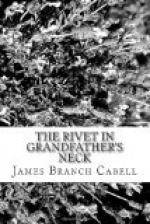“A hamlet of Hamlets,” was Patricia’s verdict as to Lichfield—“whose actual tragedy isn’t that their fathers were badly treated, but that they themselves are constitutionally unable to do anything except talk about how badly their fathers were treated.”
No, it was not altogether that these men were indolent. Rudolph and Rudolph’s peers had been reared in the belief that when any manual labor became inevitable, you as a matter of course entrusted its execution to a negro; and, forced themselves to labor, they not unnaturally complied with an ever-present sense of unfair treatment, and, in consequence, performed the work inefficiently. Lichfield had no doubt preserved a comely manner of living; but it had produced in the last half-century nothing of real importance except John Charteris.
VIII
For Charteris was important. Patricia was rereading all the books that Charteris had published, and they engrossed her with an augmenting admiration.
But it is unnecessary to dilate upon the marvelous and winning pictures of life in Lichfield before the War between the States which Charteris has painted in his novels. “Even as the king of birds that with unwearied wing soars nearest to the sun, yet wears upon his breast the softest down,”—as we learn from no less eminent authority than that of the Lichfield Courier-Herald—“so Mr. Charteris is equally expert in depicting the derring-do and tenderness of those glorious days of chivalry, of fair women and brave men, of gentle breeding, of splendid culture and wholesome living.”
Patricia was not a little puzzled by these books. The traditional Lichfield, she decided in the outcome, may very possibly have been just the trick-work of a charlatan’s cleverness; but, even in that event, here were the tales of life in Lichfield—ardent, sumptuous and fragrant throughout with the fragrance of love and roses, of rhyme and of youth’s lovely fallacies; and for the pot-pourri, if it deserved no higher name, all who believed that living ought to be a uniformly noble transaction could not fail to be grateful eternally.




